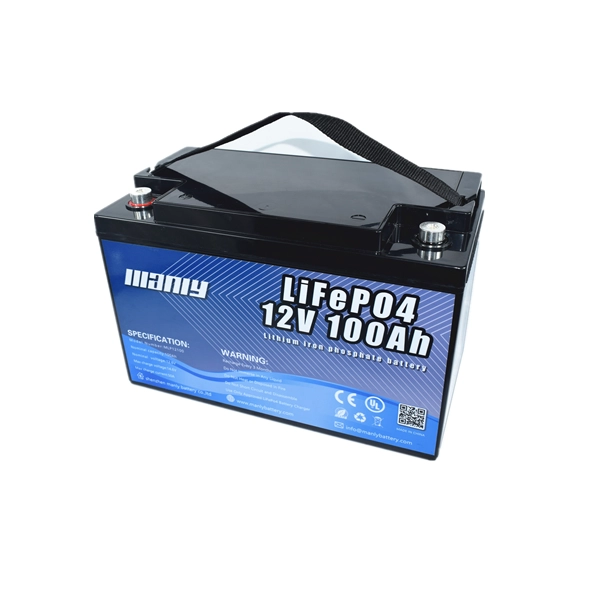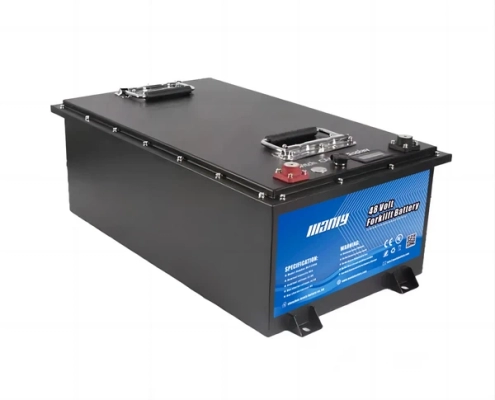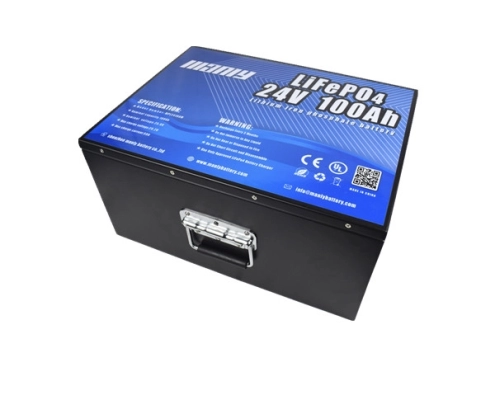What You Need to Know About the Best RV Battery in 2024
Table of Contents
Choosing the best lithium battery for your RV is not just a decision, it’s a crucial step towards ensuring a reliable and comfortable experience during your travels. Whether you’re a full-time RVer or enjoy weekend getaways, the right battery can make a significant difference in powering your appliances, storing solar energy, and providing backup power. In this guide, we’ll explore some of the top lithium batteries for RV, comparing their features, benefits, and potential drawbacks to help you make an informed decision. From the durable MANLY LiFePO4 battery to the reliable Battle Born LiFePO4 option, we’ll cover the essential details you need to know.
Essential Functions of an RV Battery
What Are RV Batteries?
Factors to Consider When Choosing an RV Battery an RV battery is not just a power source, it’s a versatile tool that empowers you to enjoy a comfortable and functional experience on the road. Unlike standard car batteries, which are designed for short bursts of energy, RV batteries are built to provide a steady and reliable power supply over long periods, making them indispensable for both short trips and extended adventures.
Types of RV Batteries
- Starting Batteries:
- Also known as chassis batteries, these are similar to car batteries.
- They are responsible for starting the engine of your RV and powering the essential electrical systems while driving.
- These batteries deliver a quick burst of energy needed to start the engine but are not intended for long-term energy storage.
- House Batteries:
- These deep cycle batteries are designed to supply a consistent power flow over extended periods.
- It is ideal for running appliances and other systems in your RV when you’re not connected to external power sources.
- Popular options for these batteries include those known for their durability and extended lifespan, making them a reliable choice for extended use.
The Purposes of RV Batteries
Powering Appliances
One of the primary purposes of an RV battery is to power essential appliances. This includes lighting, water pumps, refrigerators, and entertainment systems. Without a reliable lithium battery for an RV, your experience could be less comfortable, especially when you’re far from any external power source.
Storing Solar Power
For those who enjoy off-grid adventures, lithium batteries for RVs play a vital role in storing solar energy. During the day, solar panels generate power, which is stored in the RV battery when the sun isn’t shining. This allows you to maintain a consistent power supply even in remote locations.
Providing Backup Power
Another critical function of an RV battery is to serve as a backup power source. Whether in an emergency or experiencing a power outage at a campsite, your RV battery ensures that your essential systems remain operational.
Operating Slide-Outs and Leveling Systems
Modern RVs often come with slide-outs and leveling systems, requiring a reliable power source. The best RV deep cycle battery ensures these systems function smoothly, enhancing your RV’s livability and convenience.
Types of RV Deep Cycle Batteries
Exploring RV Deep Cycle Battery Options
When selecting the best deep cycle RV battery, it’s essential to understand the different types available. The primary options include flooded lead-acid, gel-cell, absorbed glass mat (AGM), and lithium-ion batteries. Each has unique characteristics that suit different needs.
Flooded Lead-Acid Batteries
Flooded lead-acid batteries are among the oldest and most widely used battery types. They contain lead plates suspended in a liquid electrolyte. Although affordable and versatile, they could be better for RV use due to the need for regular maintenance, the risk of spills, and the potential release of harmful gases if overcharged.
Gel-Cell Batteries
Gel-cell batteries were created to address the issues associated with flooded lead-acid batteries. These batteries use a thickened gel electrolyte, making them spill-proof and suitable for any mounting position. They are also safer for enclosed spaces as they do not emit gases. However, they are more costly and have lower energy efficiency than other battery types.
Absorbed Glass Mat (AGM) Batteries
AGM batteries are another type of sealed lead-acid battery, designed with a fiberglass mat to hold the electrolyte, preventing leaks and enabling quicker charging. RV owners appreciate AGM batteries for low maintenance and safe indoor storage. However, these batteries are heavier and less energy-dense than their lithium counterparts.
Lithium-Ion Batteries
Lithium-ion batteries represent a recent advancement in battery technology and have become increasingly popular for RVs. These batteries are lighter, more compact, and can be discharged to nearly total capacity without damage. They also recharge more quickly and have a significantly longer lifespan than lead-acid options. Additionally, lithium batteries for RV emit no harmful gases, making them safe for use in confined spaces. Although they come with a higher initial cost, their long-term benefits make them a top choice for many RV enthusiasts.
Comparing AGM and Lithium RV Batteries
When evaluating AGM and lithium RV batteries, several key differences stand out.
Depth of Discharge (DoD)
AGM batteries typically allow a depth of discharge of about 50%, while lithium batteries for RV can be safely discharged up to 80% or even 100%. This higher discharge capacity means lithium batteries offer more usable energy from the same capacity.
Lifespan
AGM batteries usually last between 3 to 5 years, offering around 300-500 charge cycles. In contrast, lithium batteries for RV can last up to 15 years, with 4,000-15,000 charge cycles, providing a significantly longer lifespan.
Size and Weight
AGM batteries are heavier, with a 12V 100Ah AGM battery weighing around 63-70 lbs. A 12V 100Ah lithium battery for RV weighs only about 21 lbs, making it a more lightweight option.
Charge Time and Efficiency
Lithium batteries recharge faster and more efficiently than AGM batteries. For instance, while an AGM battery might take 8 hours to charge fully, a lithium battery for an RV can achieve a full charge in 1-2 hours, depending on the charging system used.
Safety
Both AGM and lithium batteries are generally safe, but lithium batteries for RV offer additional safety benefits due to their lack of toxic liquids and gas emissions. They also have a Battery Management System (BMS) for enhanced protection.
Why Is the RV Battery Important?
Essential Power for Off-Grid RV Use
When camping away from traditional power sources, your RV battery is not just a power source, but a guardian of your comfort and safety. It powers vital systems like your furnace, lights, water pump, and even your refrigerator. Additionally, it keeps your entertainment devices and slide-outs functioning. If your RV has a generator, the battery is also responsible for starting it. Without a reliable deep cycle RV battery, your off-grid adventures could be significantly compromised, leaving you without the essential systems that make your RV experience enjoyable. The RV battery, therefore, is your trusted companion, ensuring your safety and comfort during your off-grid trips. It’s the peace of mind that comes with a reliable battery that allows you to fully enjoy your RV experience.
Battery Capacity: What You Need to Know
The capacity of an RV battery, measured in amp-hours (AH), is a crucial factor that determines how long it can power your devices before needing a recharge. Understanding this concept is not just informative; it’s empowering. It’s the key to managing your power needs effectively. For example, running lights that use 4 amps for 2 hours will consume 8AH of energy. This means that for a battery to meet all your power needs, a capacity of at least 100AH is often necessary. The chart above illustrates that different batteries provide varying amounts of usable capacity. A standard deep cycle battery may only give you 50AH of usable power, while a lithium battery for an RV can offer the full 100AH. This increased efficiency is a key reason why many RV owners are opting for lithium batteries over traditional options, feeling informed and knowledgeable about their power needs.
Longevity and Reliability
The lifespan of your RV battery is crucial, especially for those who frequently camp off-grid. Lithium batteries for RV are well-known for their extended life compared to other battery types. As the depth of discharge increases, the number of life cycles decreases, as shown in the second chart. However, lithium batteries are more resilient and maintain their capacity longer, even with deeper discharges. This longevity makes lithium batteries a worthwhile investment, providing consistent and reliable power over many years.
Fitting the Right Battery
Selecting the correct size battery for your RV is also critical. Your RV’s battery compartment is designed to accommodate specific dimensions, so choosing a battery that fits appropriately is essential. Flooded lead-acid batteries require a venting system to handle the gases they emit, while AGM and lithium batteries do not. This gives you more flexibility in where you can install them. Additionally, lithium batteries are lighter, which can be a significant advantage in terms of ease of installation and overall RV weight management. The convenience of a correctly sized and installed battery can make your RV experience even more enjoyable and stress-free.
In summary, the RV battery is a fundamental component that supports your vehicle’s power needs, particularly when you’re away from conventional power sources. By understanding battery capacity, lifespan, and size considerations, you can choose the best lithium battery for RV or another battery type to suit your specific requirements and ensure a comfortable and safe RV experience.
How Many RV Batteries Do You Need?
Determining Your Battery Needs
When planning your RV adventures, especially if you enjoy boondocking or off-grid camping, understanding your energy usage and figuring out how many RV batteries you need is crucial. This knowledge empowers you to make informed decisions about the type of batteries you choose and how often you’ll have access to charging sources like solar panels or generators.
Conservative Approach: More Capacity for Peace of Mind
If you are cautious and prefer to avoid running out of power, your conservative approach with around 300-600 amp-hours (AH) of battery capacity can provide security and preparedness. This capacity allows you to handle a few cloudy or rainy days without worrying about draining your batteries, extending their life and reducing the need for constant recharging.
However, batteries that are 300-600AH with traditional lead-acid batteries carry much weight—around 180-360 pounds. This setup can be cumbersome and may not be practical for all RVs. Additionally, lead-acid batteries lose about 0.6% of their charge each day, even when not in use, which is something to consider when planning your energy needs.
Liberal Approach: A Lighter and More Flexible Setup
If you prefer a more flexible and adaptable approach, you might find that 100-200AH of battery capacity is sufficient. This setup is lighter, takes up less space, and is more budget-friendly, allowing you to be resourceful and make the most of your energy usage, especially if you rely heavily on solar power.
With this setup, you may need to supply charging with another power source, mainly if you use energy appliances like microwaves or air conditioners. It’s important to note that solar power generation can be significantly reduced on cloudy or rainy days, so having a backup power source is advisable. However, many RVers find that 100-200AH of capacity is enough to get them through the night and handle a day or two of less-than-ideal weather, even with these appliances.
This is typical useage in RV:
| Regular Devices | |||
| Device | Hours Run | Power Consumption (kWh) | AH |
| Laptop | 5 | 0.5 | 41 |
| Rice Cooker | 1 | 0.4 | 33 |
| Pressure Cooker | 1 | 0.45 | 37 |
| Electric Kettle | 0.5 | 0.2 | 16 |
| LED Lights (3) | 5 | 0.15 | 12 |
| Total AH for Regular Devices | 139 | ||
| Extra Devices | |||
| Device | Hours Run | Power Consumption (kWh) | AH |
| 21-inch TV | 10 | 0.5 | 41 |
| Refrigerator | 24 | 0.5 | 41 |
| Electric Heater | 1 | 0.35 | 29 |
| Air Conditioner | 5 | 5 | 416 |
| Total AH for Extra Devices | 527 | ||
The 6 BEST Lithium Battery for RV
MANLY LiFePO4 Battery: Unmatched Performance for RVs
When it comes to selecting the best lithium battery for RVs, the MANLY LiFePO4 battery stands out. Renowned for its exceptional quality and innovative features, this battery is designed to meet the needs of both casual campers and full-time RVers.
Key Features:
- High Production and Reliability: MANLY Battery is one of China’s leading battery manufacturers, producing 6MWh of battery cells and packs daily. With over 13 years of experience, their commitment to quality is evident in every battery they produce.
- MANLY offers a diverse range of lithium batteries for RVs, from 6V to 72V, suitable for various applications, including solar energy storage, UPS systems, and golf cart batteries. This versatility makes the MANLY LiFePO4 Battery a reliable choice for RV owners with different power needs.
- Customized Solutions: MANLY provides tailored battery solutions to meet specific needs, whether it’s voltage, capacity, or design.
Pros:
- Durability in Harsh Conditions: These batteries operate efficiently between -20°C to 75°C (-4°F to 167°F), making them perfect for all climates.
- Superior Efficiency: With a 95% energy efficiency rate, MANLY batteries outperform traditional lead-acid batteries, which average around 70%.
- Safety Features: These batteries are designed with user safety in mind, and they are equipped with short circuit protection, overcharge safeguards, and overcurrent prevention.
Cons:
- Initial Cost: While MANLY batteries offer long-term savings, the upfront cost may be higher than other options.
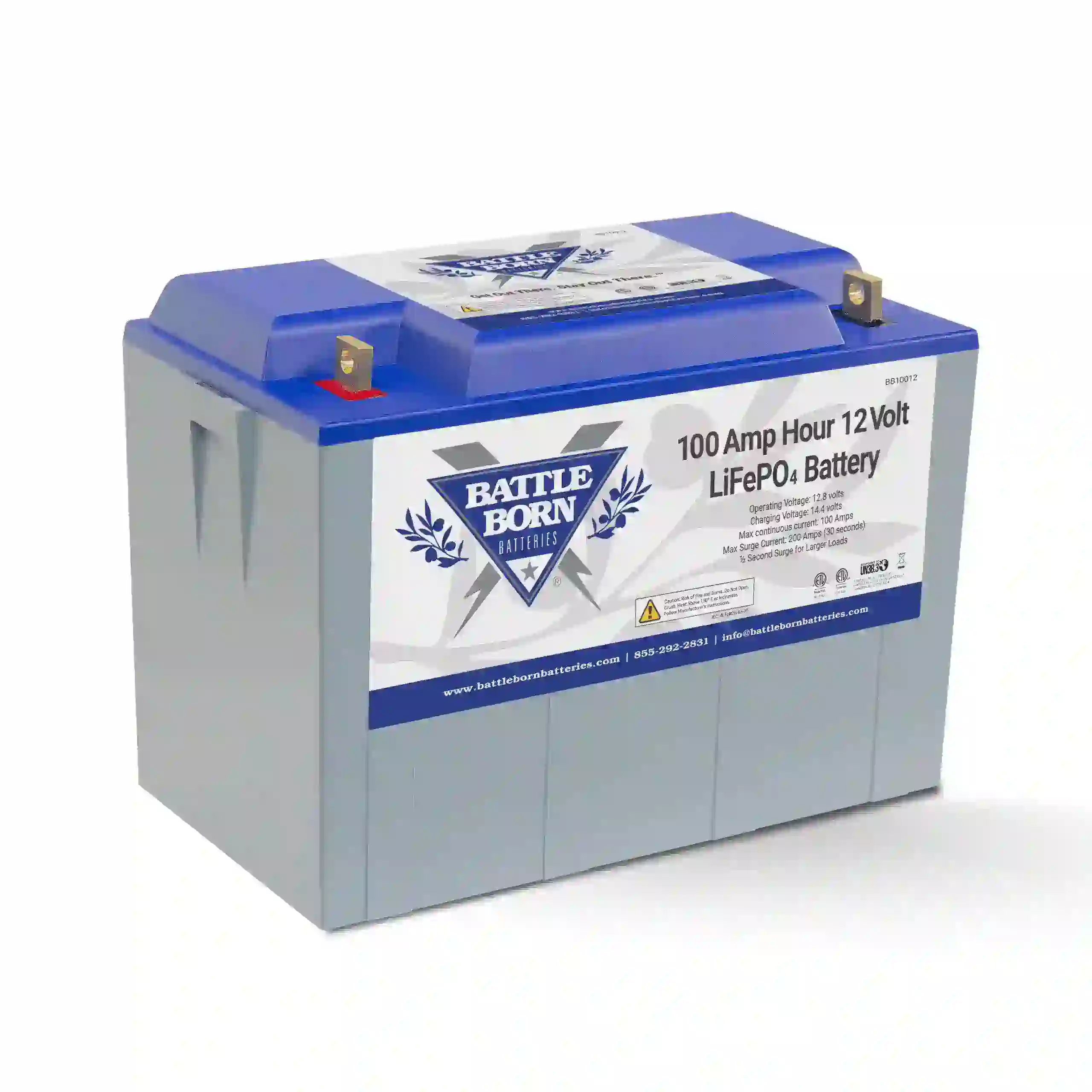
Battle Born LiFePO4 Battery: A Strong Contender
Another excellent option for RVers is the Battle Born LiFePO4 Deep Cycle Battery. Battle Born batteries are manufactured in the USA to replace traditional lead-acid batteries and provide superior performance.
Key Features:
- Long Lifespan: These batteries are capable of handling 3,000 to 5,000 cycles and offer 10 to 15 years of service life, making them a durable choice.
- Efficient Charging: Battle Born batteries charge up to five times faster than traditional lead-acid batteries, ensuring you spend less time waiting for a full charge.
Comprehensive Warranty: With a 10-year warranty, Battle Born stands by the quality of their products, providing RV owners with a sense of security and peace of mind.Pros:
- Temperature Protection: The built-in Battery Management System (BMS) protects against extreme temperatures, ensuring reliable performance in various conditions.
- Low Maintenance: These batteries require less maintenance than other types, making them convenient for busy RVers.
Cons:
- Compatibility Issues: Some users have noted that these batteries may have compatibility concerns with specific RV systems.
- Overcharging Sensitivity: While the BMS provides protection, care must be taken to avoid overcharging.
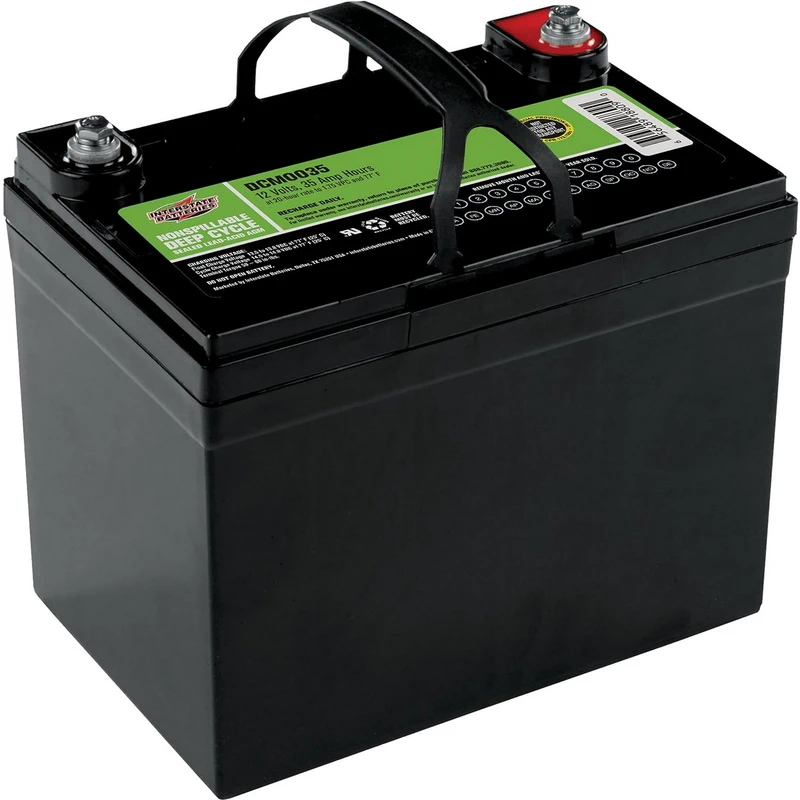
Interstate Batteries AGM Deep Cycle Battery
One popular option is the Interstate Batteries AGM Deep Cycle Battery. This battery operates at 12 volts and has a 35 ampere-hour (Ah) capacity. It’s compact, measuring 7.68 x 5.16 x 6.42 inches, making it easy to fit in most RV setups. Weighing just 22.9 pounds, it’s lighter than many other options, which is a significant advantage for minimizing weight.
The AGM (Absorbed Glass Mat) design prevents spills and enhances resistance to vibrations, making it a durable choice for RVers. However, with only a 35 Ah capacity, more than this battery may be required for users with higher energy demands. It’s a solid option for those who prioritize reliability in cold conditions and need a lightweight battery.
Pros:
- Spill-proof AGM design
- Lightweight at 22.9 pounds
- Reliable performance in cold weather
- Good resistance to vibrations
Cons:
- Limited 35 Ah capacity
- Potentially shorter lifespan
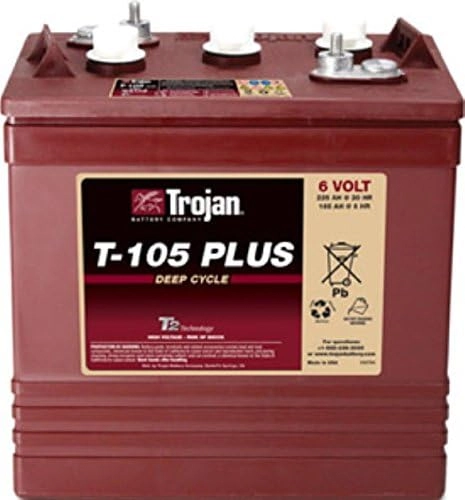
Trojan Battery T-105 Plus 6V
Another highly recommended option is the Trojan Battery T-105 Plus 6V. Trojan is a well-known brand in the battery industry, particularly for heavy-duty applications. This package includes four 6V deep cycle batteries, offering a combined capacity ideal for RVs, especially those with high power demands.
Each T-105 battery offers a substantial 225 Ah capacity, making it suitable for extended use, even in fully loaded RV trailers. The batteries are relatively compact, weighing about 62 pounds each, and feature Trojan’s T2 Technology, which increases their capacity and overall lifespan.
However, it’s important to note that these are wet-cell batteries requiring regular maintenance. This includes checking water levels and ensuring proper ventilation. Despite this, their high capacity and durable design make them a top choice for many RV owners.
Pros:
- High 225 Ah capacity per battery
- Includes four batteries for ample power
- Durable, compact design
- Enhanced performance with T2 Technology
Cons:
- Requires regular maintenance due to wet cell design
- Heavier at 62 pounds per battery
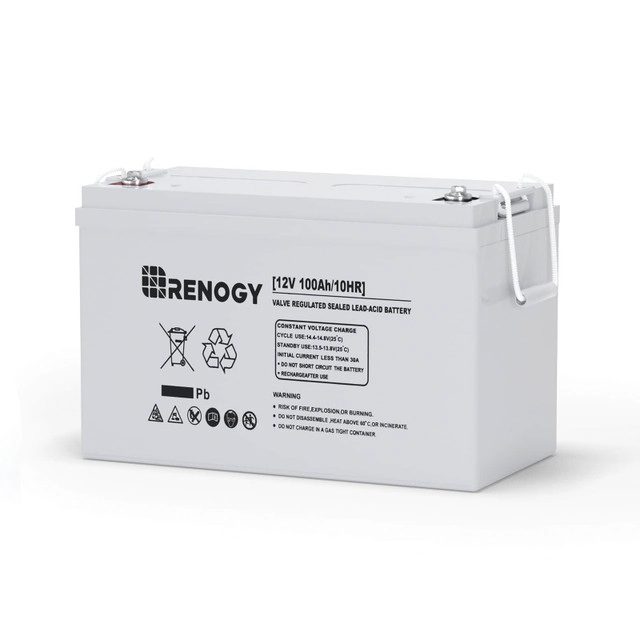
Renogy 12 Volt Deep-Cycle AGM Battery
If you’re searching for a dependable lithium battery for an RV, the Renogy 12V Deep-Cycle AGM Battery is a top choice. This battery is known for its durability and performance, especially in harsh conditions. It’s designed with a leak-proof, rugged build, making it perfect for RVs and off-grid solar systems. One standout feature is its enhanced electrolyte formula, which ensures stable performance even in cold temperatures. With a low self-discharge rate of under 3% at 77°F, this battery offers a long shelf life, making it a reliable option for RV owners.
Pros:
- Long shelf life with low self-discharge
- Excellent performance in cold conditions
- Environmentally friendly, made from safe, nontoxic materials
Cons:
- Higher price point
- Bulky and heavy
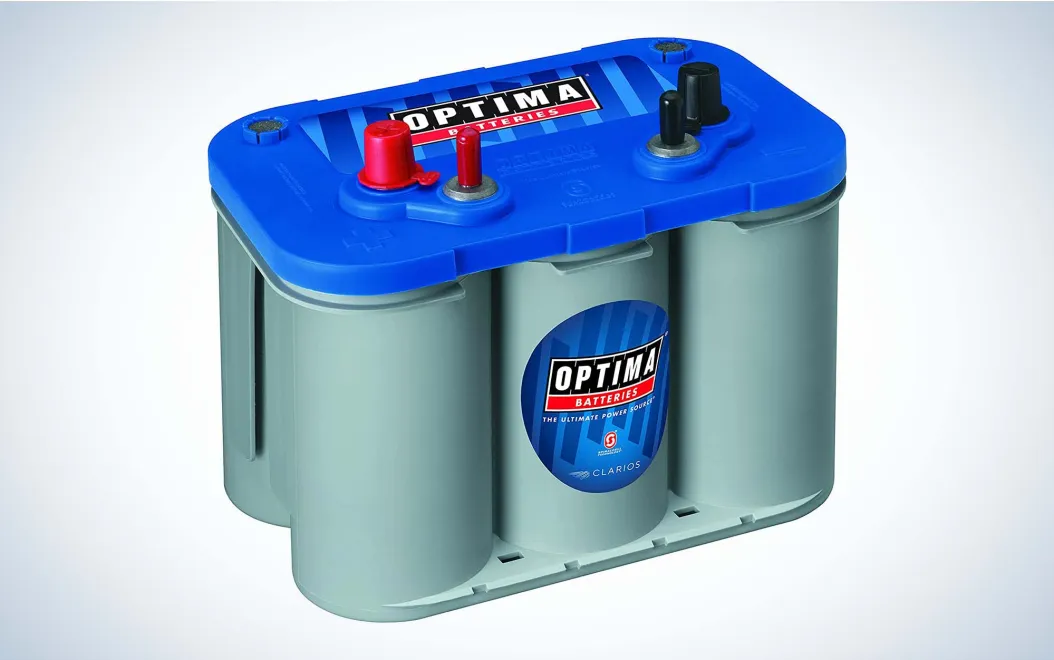
Optima Batteries 8016-103 Deep-Cycle Battery
For those who travel in freezing temperatures, the Optima 8016-103 Deep-Cycle Battery is an excellent option. It boasts a high cold cranking power (750 CCA), ensuring your RV starts smoothly even in the coldest weather. This battery also offers 120 minutes of reserve capacity, providing consistent performance. While it’s pricier, its versatility across different vehicles makes it a great investment, providing RV owners with reassurance about their purchase.
Pros:
- High cold cranking power for reliable starts in cold weather
- Versatile use across different vehicles
- High reserve capacity for steady performance
Cons:
- Expensive
- Warranty details are unclear
Conclusion
When selecting the correct lithium battery for your RV, the options are as follows: ait’s-verse as your specific needs. A battery is perfect whether you’re looking for durability in harsh conditions, efficiency, or low maintenance. The MANLY LiFePO4 battery offers high performance and versatility, making it a great choice for those looking for long-term reliability. On the other hand, the Battle Born LiFePO4 battery is an excellent option for those who prioritize fast charging and a long lifespan. By understanding the features and benefits of each option, you can confidently choose the best lithium battery for your RV that fits your lifestyle and travel needs, ensuring that your adventures are always powered up and ready to go.

